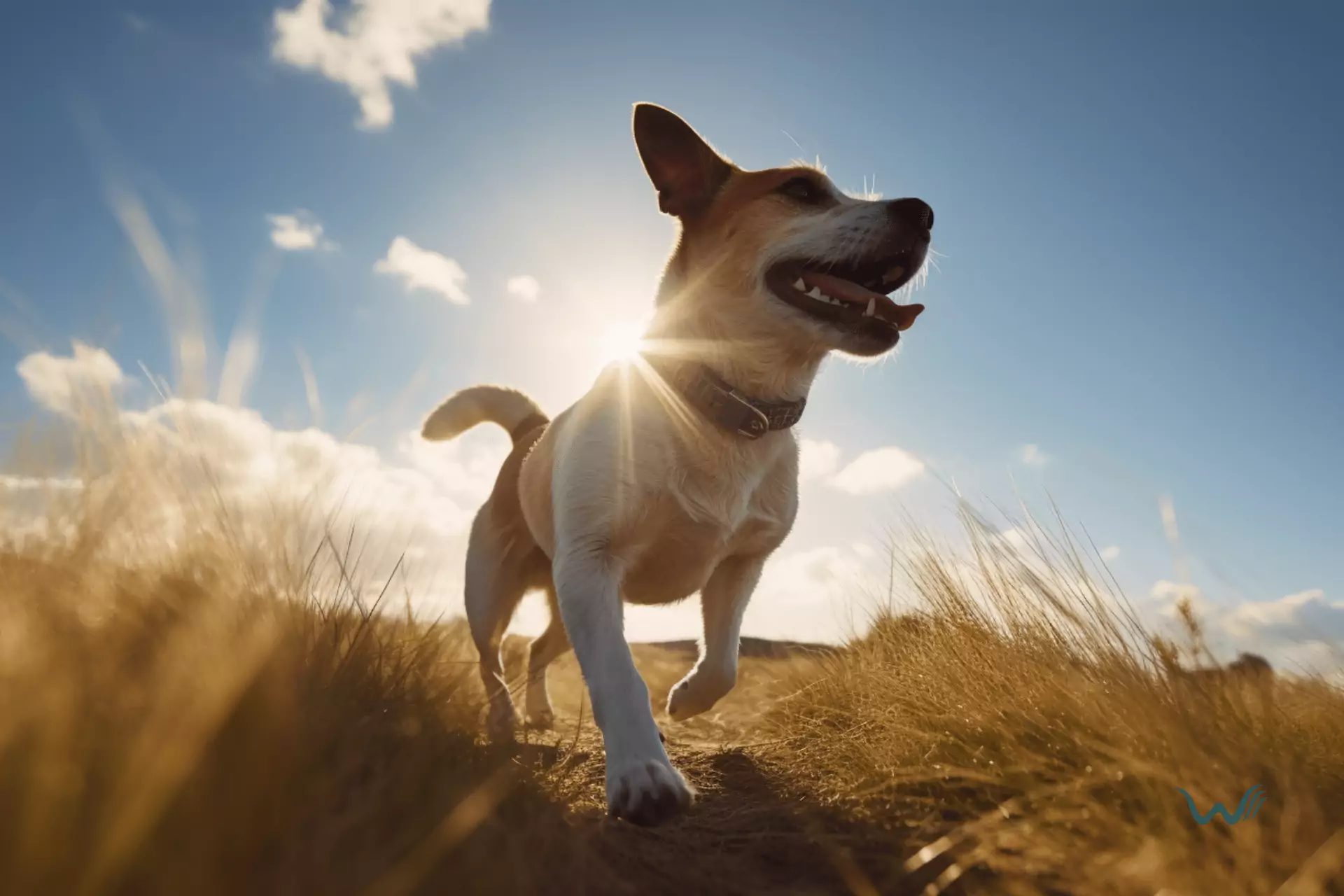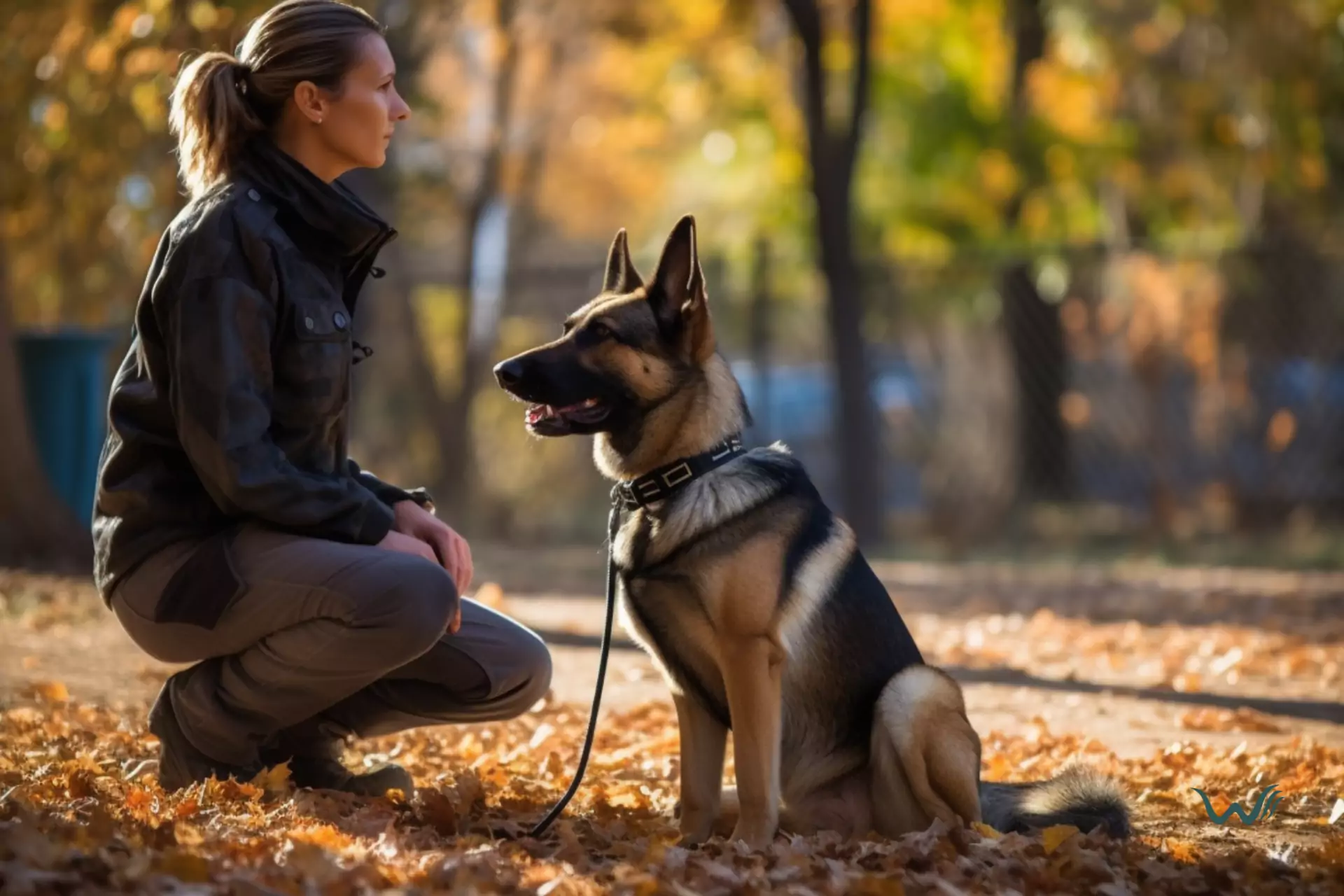

Why Do Dogs Kick After They Potty?
by Haley Mills
Last updated: January 30, 2024
Verified and Approved by:
Angela Morris,
MSW, LCSW
Fact Checked

When you take your dog for a walk, and they finish their business, you may have noticed that they often kick the ground with their hind legs. This behavior, known as the post-potty kick, is not just a random movement, but rather has specific reasons and significance in the canine world.
The post-potty kick is a behavior commonly observed in dogs, and it serves several purposes. One of the main reasons dogs kick after they potty is to mark their territory. Dogs have a highly developed sense of smell, and by kicking the ground, they are dispersing their scent around the area, effectively leaving their “calling card.”
This scent marking behavior allows dogs to communicate with other canines, conveying information about their presence and territory ownership. Furthermore, kicking also helps spread their scent over a larger area, making their marking more noticeable to other dogs.
This article will explore the science behind the post-potty kick, delve into the instinctual behaviors in dogs, and discuss the evolutionary explanations for this fascinating behavior.
Key Takeaways
- Dogs kick after pottying to mark their territory and communicate with other dogs.
- The post-potty kick helps spread their scent and make their marking more noticeable.
- Excessive kicking behavior can be discouraged through redirection and positive reinforcement training.
- The post-potty kick serves purposes such as scent marking, evolutionary advantages, and social bonding.
Understanding Canine Behavior
So, you might be wondering why your furry friend kicks after they do their business. This behavior, known as “ground scratching” or “ground kicking,” is actually quite common among dogs and has several possible explanations.
One common misconception is that dogs kick to cover up their waste. While this may seem logical, it isn’t supported by scientific evidence. Dogs kick after potting for various reasons, none involving covering up their waste.
One possible explanation for this behavior is that it’s a way for dogs to mark their territory. By kicking up dirt or grass after they potty, dogs leave behind their scent and visually mark the area as their own. This behavior is more common in male dogs with a stronger instinct to mark their territory.
Another possible explanation is that dogs kick to spread their scent to other dogs in the area. By kicking up dirt or grass, dogs release pheromones from the scent glands in their paws, which can communicate information to other dogs.
If your dog’s kicking behavior becomes excessive or problematic, there are ways to discourage it. One approach is redirecting their behavior by providing an alternative outlet for their energy. Engaging your dog in interactive play or providing puzzle toys can help redirect their energy away from kicking.
Another approach is to use positive reinforcement training to teach your dog an alternative behavior. For example, you can train them to sit or lie down after they potty instead of kicking. Consistency and patience are key when training your dog, so reward and praise them when they exhibit the desired behavior.
The Science Behind the Post-Potty Kick
Upon completing their bathroom duties, canines instinctively engage in a unique behavior known as the post-potty kick. This behavior, which involves vigorously kicking their hind legs against the ground or grass, may seem odd or unnecessary to us humans, but it actually serves several important purposes in the canine world.
- Scent marking: One of the main reasons dogs kick after they potty is to leave their scent behind. When dogs urinate or defecate, they release pheromones that contain specific information about their identity, reproductive status, and health. By kicking their legs, dogs are able to spread these pheromones over a larger area, signaling their presence and marking their territory to other dogs in the vicinity. This behavior helps establish boundaries and communicate with other canines in the area.
- Evolutionary advantages: The post-potty kick also has evolutionary advantages for dogs. In the wild, dogs would often need to conceal their presence from potential prey or predators. By kicking up dirt or grass after eliminating, dogs are able to partially bury their scent, making it harder for other animals to detect their presence. This behavior could have helped them avoid being detected or tracked by predators, increasing their chances of survival.
- Social bonding: Another possible reason dogs engage in the post-potty kick is for social bonding purposes. Dogs are highly social animals that rely on communication with their pack members. By leaving their scent and kicking the ground, dogs may be sending a signal to other dogs in their pack, indicating their location and providing information about their recent activities. This behavior can help strengthen social bonds and maintain cohesion within the group.
Instinctual Behaviors in Dogs
One common behavior in canines is their tendency to kick their feet after completing their bathroom activities. This behavior is believed to be an instinctual behavior that serves multiple purposes.
One possible explanation for this behavior is that dogs explore and mark their territory. By kicking their feet, dogs spread their scent and leave their mark on the area they’ve just relieved themselves in. This is a way for them to communicate to other dogs that this territory is claimed and establish their presence there.
Additionally, the kicking behavior may also have social implications of scent marking. Dogs have a highly developed sense of smell, and by kicking their feet, they spread their scent in the surrounding area. This scent can communicate to other dogs, conveying information about the dog’s identity, reproductive status, and even their emotional state. By leaving their scent behind, dogs essentially leave a message for other dogs to pick up on and interpret.
Communication Through Scent Marking
Communication through scent marking is a behavior exhibited by dogs when they engage in kicking after eliminating waste. This behavior serves as a way for dogs to communicate with other animals and mark their territory.
Here are some key points to understand about communication through scent marking:
- Behavioral cues: Dogs use scent marking to communicate various messages to other animals. By kicking the ground after eliminating waste, dogs leave behind their scent and pheromones, which can convey information about their age, sex, and reproductive status. Other dogs who come across these markings can gather important information about the dog that left them.
- Territory marking: Dogs are known to be territorial animals, and scent marking is a critical way to establish and defend their territory. The act of kicking after eliminating waste helps spread their scent over a larger area, effectively marking their territory and sending a message to other dogs that this area is already claimed.
- Social bonding: Scent marking also affects social bonding among dogs. By leaving their scent in specific areas, dogs can establish a sense of familiarity and belonging. This can be particularly important in multi-dog households or in dog parks, where dogs may encounter unfamiliar animals. Scent marking helps dogs establish identity and create a familiar environment.
- Communication with humans: While scent marking is primarily a form of communication among dogs, it can also serve as a way for dogs to communicate with their human companions. Dogs may kick after eliminating waste to leave their scent and mark their presence in the environment, signaling to their owners that they’ve been there.
Do Dogs Eat Grass as a Way to Settle Their Stomach after Kicking?
Some experts believe that one of the reasons dogs eat grass is to settle their stomachs after feeling unwell. It can act as a natural emetic, helping them to rid their bodies of whatever might be causing the discomfort. However, this behavior isn’t fully understood and more research is needed.
Evolutionary Explanations for the Behavior
One explanation for the kicking behavior is that it helps to spread the scent more effectively. By scratching the ground with their hind legs, dogs can disperse their scent over a larger area, making it easier for other dogs to detect and interpret the message.
This method of scent marking allows dogs to communicate important information about their presence, territory, and reproductive status to other dogs in the area. The kicking behavior may also serve as a way for dogs to mark their territory physically.
By leaving their scent on the ground, dogs are able to establish a clear boundary and communicate to other dogs that the area has been claimed. This territorial marking is an essential aspect of dog behavior and can help to prevent conflicts and establish social hierarchies among dogs.
Wrapping Up
The behavior of dogs kicking after they potty can be traced back to their instinctual behaviors and their need to communicate through scent marking. This behavior is deeply rooted in their evolutionary history and serves several purposes.
Firstly, the kicking motion helps dogs spread their scent. By kicking up dirt or grass after they potty, dogs essentially mark their territory and leave their scent behind. This is a form of communication with other dogs, as the scent can convey information about the dog’s presence, status, and reproductive readiness.
Additionally, the kicking motion may also serve the purpose of covering up their waste. Dogs in the wild have a natural instinct to bury their waste to avoid attracting predators or other animals. Even though domesticated dogs may not face the same threats, this instinctual behavior still persists. The kicking motion helps them to cover up their waste and maintain a clean environment.
Overall, dogs kicking after they potty is a fascinating aspect of canine behavior. Understanding the science behind this behavior can help us gain a deeper appreciation for our beloved furry friends‘ complex instincts and communication methods.
Certify Your Emotional Support Animal Today

Why You Can Rely on Us?
At Wellness Wag, we believe your pet deserves care rooted in both science and compassion. Each article is carefully researched, written in clear language for pet owners, and then reviewed by qualified professionals to ensure the information is evidence-based, current, and practical for real-life care. Our goal is to help you feel confident in making informed decisions about your pet’s health and well-being.
Reviewed by
Angela Morris, MSW, LCSW
Angela is a licensed clinical social worker with 20 years of experience in patient advocacy and community mental health. She has assisted numerous clients with ESA evaluations and brings a deep understanding of disability accommodations, ensuring that all information is accurate, supportive, and practical.

Written by :
Haley Mills
Last Updated :
January 30, 2024










